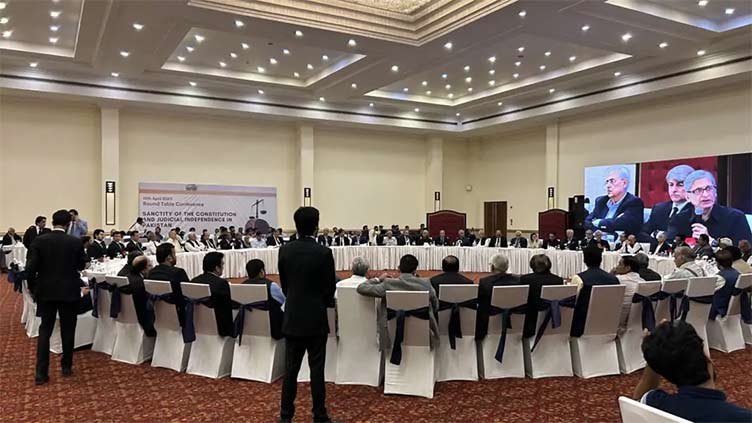Senior lawyers declare Constitution is supreme, not parliament

Pakistan
No one, including the prime minister and army chief, could defy the apex court order regarding polls
LAHORE (Dunya News) – Senior lawyers on Saturday rebutted legislators’ argument that the parliament is supreme declaring that the Constitution is supreme.
The lawyers gave their opinion at a roundtable conference titled “Sanctity of the Constitution and Judicial Independence in Pakistan” attended by Barrister Aitzaz Ahsan, Hamid Khan, Sardar Latif Khosa, Khwaja Tariq Rahim, Abid Zuberi, Rabbiya Bajwa, Salman Akram Raja and Anwar Mansoor Khan.
Mr Ahsan, Mr Khosa and Mr Rahim were the hosts and members of the Hamid Khan-led Professional Group and the PTI’s Insaf Lawyers Forum attended the meeting.
Speaking on the occasion, PPP leader Aitzaz Ahsan said no one, including the prime minister and army chief, could defy the Supreme Court order about holding elections within stipulated time frame as enunciated in the Constitution.
[English Subtitles]
— PTI Canada Official (@PTIOfficialCA) April 16, 2023
Barrister Aitzaz Ahsan along with other experts at the Senior Lawyers Round Table conference on Judiciary spoke eloquently and advocated for the importance of respecting the decision of the Supreme Court to hold elections on May 14th [in Punjab]. He also… pic.twitter.com/QoAJ63g12n
The defiance of the apex court’s order regarding elections in Punjab and Khyber Pakhtunkhwa would lead to contempt proceedings, he added.
According to the barrister, the core issue at present was whether elections should be held within the constitutional timeline of 90 days. The debate on the composition of benches and the question whether the apex court’s order for polls was majority or minority had no significance, he continued.
Hamid Khan termed it unfortunate that everyone was interpreting the Constitution according to his whims. The people favouring a general election in the whole country at one time were incorrect in their interpretation as it was not written in the Constitution, he said.
[English Subtitles]
— PTI Canada Official (@PTIOfficialCA) April 16, 2023
Speaking at the Senior Lawyers Round Table Conference, Hamid Khan questioned the stance of the government in the assembly that the Supreme Court order is not acceptable to them. He further explains that it is clearly a violation of Constitution of Pakistan… pic.twitter.com/JS45so2nfR
All institutions were bound to obey the Supreme Court’s orders. Lawyers had a prime responsibility to stand with the Constitution and judiciary, he maintained.
Mr Khosa, who has served as Punjab governor, attorney general, senator and PPP’s secretary general during the party’s stint in the government, said he preferred to stand by the Constitution and the country.
Last week, he was removed as president of the PPP’s legal wing following his criticism of the policies of the coalition government.
Supreme Court Bar Association President Abid Zuberi stressed that all institutions were subordinate to the Constitution. If the government wanted to delay the election, it should introduce a constitutional amendment, he opined.
He said that Constitution did not allow any legislation to curtail the powers of Supreme Court.
Lahore High Court Bar Association vice president Rabbiya Bajwa said politicians should stop calling the parliament supreme, adding that in fact it is the Constitution that is supreme.
Where was the supremacy of parliament when it gave extension to an army chief and endorsed establishment of military courts, she asked.
Ms Bajwa said holding elections in Punjab and KP was a constitutional mandate and political parties should not violate it.
Senior lawyer Salman Akram Raja said sanctity of Constitution was not possible without an independent and united judiciary.
Well said, @salmanAraja. You are putting many others who set themselves up as constitutionalists, to shame!
— Taimur Khan Jhagra (@Jhagra) April 15, 2023
"جمہوریت ہماری آئین کا بنیادی تقاضہ ہے - لہٰذا یہ کہا کہ ۹۰ دن ہو گئے تو کیا ہوا؟ میں کہتا ہوں
آسمان گر گیا!"pic.twitter.com/Ahm0p9ZODL
He said defiance of the 90-day timeline for general elections was in fact a disregard to Constitution.
Former attorney general Anwar Mansoor Khan urged senior lawyers to play their role to bring unity among the judges. The preamble of the Constitution provides that the state was supposed to be run by the elected representatives.
However, he added, it was also written in the same book that Constitution had to be followed.
He said it was a mistaken concept that parliament was the only supreme institution.
Later, a statement issued by the hosts said elections to Punjab and KP assemblies be held at once as per the dictates of the Constitution as elucidated in the SC order.
It said SC’s internal issues be decided by the judges themselves through comity of judges and mutual respect. Any permissible legislation to regulate the court or its processes ought not to be deployed, to destroy the court, its independence and authority.

